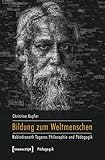Bildung zum Weltmenschen : Rabindranath Tagores Philosophie und Pädagogik / Christine Kupfer.
Material type: TextSeries: PädagogikPublisher: Bielefeld : transcript Verlag, [2014]Copyright date: ©2013Edition: 1. AuflDescription: 1 online resource (430 p.)Content type:
TextSeries: PädagogikPublisher: Bielefeld : transcript Verlag, [2014]Copyright date: ©2013Edition: 1. AuflDescription: 1 online resource (430 p.)Content type: - 9783837625448
- 9783839425442
- 891.4414 23
- PK1725 .K874 2014eb
- online - DeGruyter
| Item type | Current library | Call number | URL | Status | Notes | Barcode | |
|---|---|---|---|---|---|---|---|
 eBook
eBook
|
Biblioteca "Angelicum" Pont. Univ. S.Tommaso d'Aquino Nuvola online | online - DeGruyter (Browse shelf(Opens below)) | Online access | Not for loan (Accesso limitato) | Accesso per gli utenti autorizzati / Access for authorized users | (dgr)9783839425442 |
restricted access online access with authorization star
http://purl.org/coar/access_right/c_16ec
How can it be possible to mold oneself into a »citizen of the world«, encompassing the entire cosmos within oneself? In the educational philosophy of Rabindranath Tagore (1861-1941), winner of the Nobel Prize for literature and celebrated as »India's Goethe«, this is the defining issue. Bildung zum Weltmenschen (Education for the citizen of the world) makes apparent for the first time the close integration of Tagore's complex philosophical and pedagogical thinking. The philosopher, who throughout his life worked to synthesize Indian and Western ideas and implemented this synthesis in practice, proves to be a radical pioneer for a new artistic, intercultural, and spiritual practice in close touch with nature.
Wie kann es gelingen, sich zu einem »Weltmenschen« zu bilden, der den ganzen Kosmos in sich selbst umfasst? Dies ist die bestimmende Frage der Bildungsphilosophie Rabindranath Tagores (1861-1941), des als »Goethe Indiens« gefeierten Literatur-Nobelpreisträgers. »Bildung zum Weltmenschen« zeigt zum ersten Mal die enge Verflechtung von Tagores komplexem philosophischen und pädagogischen Denken.Tagore verbindet indische und westliche Ideen miteinander und schöpft daraus einen originellen spirituellen Humanismus. In seinen pädagogischen Experimenten erweist er sich als radikaler Vordenker für eine neue künstlerische, interkulturelle, spirituelle und naturverbundene Bildungspraxis.
Mode of access: Internet via World Wide Web.
In German.
Description based on online resource; title from PDF title page (publisher's Web site, viewed 01. Nov 2023)


